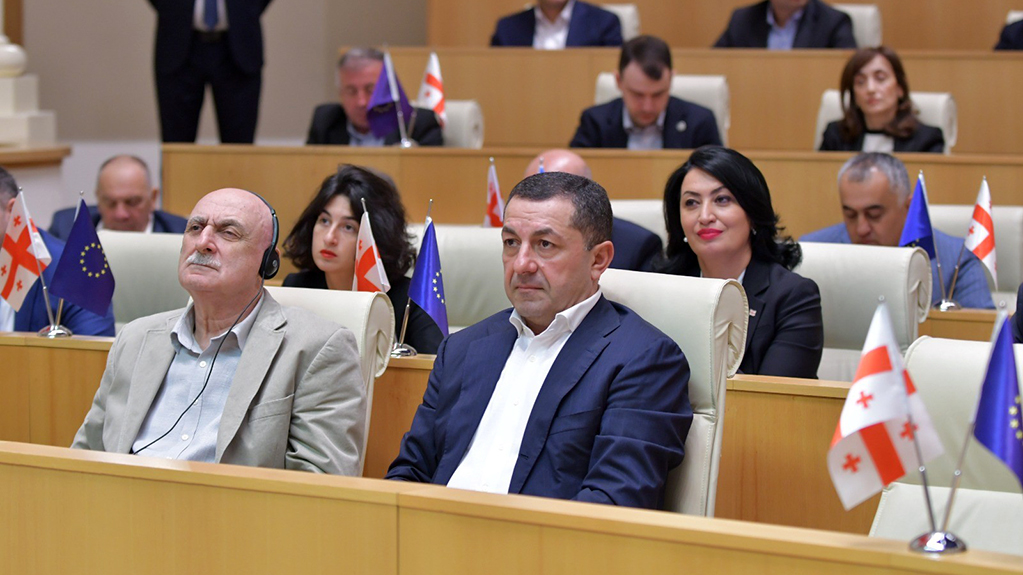The Parliament of the 10th convocation adopted the legislative package in its third and final reading, which includes restrictions on the rights of LGBT people and the introduction of censorship. The bill, On Family Values and Protection of Minors, was supported by 84 MPs, with no votes against it. The majority of opposition MPs were absent from the session.
News
"Working on this initiative drew a very clear line regarding who chooses what: who chooses to act in the best interests of society, and who is merely an executor of external orders. Who truly values the protection of human rights, and who seeks to promote propaganda and harmful influences? Who defends minors from harmful influences, and who tries to popularize among them issues like gender reassignment surgeries and LGBT propaganda textbooks in schools and kindergartens? It is a fact that this initiative has turned the opposition away from Parliament, and the opposition is now being sought.
It is crucial for this initiative to have the support our society demands, and for work to continue in the next Parliament within the framework of a constitutional majority," said Rati Ionatamishvili, a member of Georgian Dream and one of the authors of the amendments, before the vote.
Georgian Dream has made changes to various laws, banning the production of “LGBT propaganda" in educational institutions and on television. Additionally, assemblies and demonstrations will be prohibited if they aim to "promote a person’s identification with a gender different from their own, same-sex relationships, or incest." Police will have the right to ask such gatherings to disperse.
It will also no longer be permitted to register a union between individuals of the same biological sex as a marriage, and any such union, registered or recognized as a marriage abroad, will not be legally valid in Georgia.
Adoption of a minor by a person who does not identify with any biological sex or who identifies with a gender different from their biological sex, or whose sexual orientation is not heterosexual, will be prohibited.
According to the legislative changes, performing surgical operations or other types of medical procedures aimed at changing a person’s sex is forbidden. Additionally, during civil act registration, it is prohibited to record a gender different from the person's biological sex.
The changes also extend to labor relations. Specifically, any obligation within the scope of labor relations that disregards biological sex will be invalid.
Furthermore, the amendments declare May 17 as the Day of Family Sanctity and Respect for Parents, which will be a holiday under the Labor Code.
Prior to the adoption of the bill in the third reading, several civil society organizations issued a statement. They argued that the changes aim to manipulate the public ahead of elections, distract from real issues, incite irrational fear, and create yet another barrier on Georgia’s path to European integration.
"The package of laws, hypocritically titled 'Family Values and Protection of Minors,' does not actually address the real, pressing challenges facing families and minors in Georgia. These challenges include poverty, inflation, increasing emigration, lack of access to basic needs, inadequate infrastructure for a dignified life, unfair and unequal distribution of resources, poor-quality healthcare and education, environmental degradation, and more."
Non-governmental organizations have appealed to President Salome Zourabichvili to veto the changes and prevent the legalization of hatred, censorship, and oppression.
The United Kingdom Embassy in Georgia also responded to Parliament's decision. The diplomatic mission stated that the legislative package undermines fundamental human rights, including freedom of expression and assembly, and risks further stigmatization and discrimination against parts of Georgia's population.
"This legislation impacts the rights of all Georgian citizens. We call on the Georgian authorities to reconsider the package of laws on “family values and protection of minors” which together with the Law on Transparency of Foreign Influence place restrictions on both civil society and individual Georgians and call into question the breadth of the UK Georgia relationship," the embassy expressed concern, noting that Parliament passed the changes while ignoring the recommendations of the Venice Commission.
In addition to this legislative package, Georgian Dream introduced the draft constitutional law On Family Values and Protection of Minors, which did not receive the required constitutional majority (113 deputies) in the Parliament of the 10th convocation. The Venice Commission's conclusion stated that adopting the draft constitutional law would increase the risk of strengthening stigma and prejudice and fostering homophobia, which is incompatible with the principles of equality, pluralism, and tolerance essential to a democratic society. The Venice Commission recommended that Parliament conduct a full review of the legislative changes.















